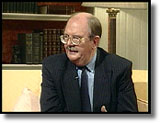
|
Unions Fear End of Link With LabourLew Adams, the leader of Aslef, the train drivers union, has added to criticisms of Tony Blair's vision of the Labour Party's future. Mr Adams hinted that the Trades Union Congress might have to think about new ways of seeking political representation other than through the party.He told the BBC's Breakfast with Frost programme: "This Government appears to be listening to the Liberals and the CBI and all other factions. Why don't they listen to the trade unions? Why diminish our role? We worked with the Labour Party to get them into power. We are pleased and we are dying to see them succeed."
Mr Adams was reacting to new party proposals that will see the Labour's annual conference lose its policy making function which will move instead to a rolling policy forum directed by the National Executive Committee.
Mr Adams said: "I think there is a genuine feeling that there are those that
wish to change the constitution (of the Labour Party) so that it disenfranchises the trade unions themselves.
|

|
| John Edmonds: "Unions must have a decision-making role" |
Mr Edmonds rejected as "bizarre and old-fashioned" the idea of making party policy on the basis of three-minute speeches at the party conference.
"But, if you take a more measured and research-based approach to policy, that doesn't mean you reduce the conference to something close to a rally," he explained. "You have to give the constituency parties...the trade unions the opportunity of bringing the important issues of the day to the party conference for discussing that year. That I think is a weakness, perhaps it's a misunderstanding."
Reassurances From Party Spokesman
A Labour Party spokesman said that the proposals for reforming party
conference would not lead to constituency parties and unions losing their
voice.
The document outlining a new relationship between the leadership in government
and the party - Party into Power - would greatly modernise party procedures both at annual conference and throughout the year.
"The assertion by Ken Livingstone and others that the proposals in 'Party into Power' will not allow conference to debate issues of immediate interest is simply wrong," the party spokesman said.
He said that the document mapping out the changes, which would go to the party's National Executive Committee on Wednesday, made clear that each constituency Labour Party, trade union and affiliated organisation will be able to submit one resolution to conference on a topic not addressed on the conference agenda.
That agenda will be made up of the rolling programme of work being considered by the party's National Policy Forum and reports from the NEC. But the committee organising the conference will consider the motions from local parties and unions and ask conference delegates to decide which issues it wishes to debate.
Diana, Princess of Wales, 1961-1997
Conference 97
Devolution
The Archive
News |
Issues |
Background |
Parties |
Analysis |
TV/Radio/Web
Interactive |
Forum |
Live |
About This Site
News |
Issues |
Background |
Parties |
Analysis |
TV/Radio/Web
Interactive |
Forum |
Live |
About This Site
© BBC 1997 |
politics97@bbc.co.uk |
